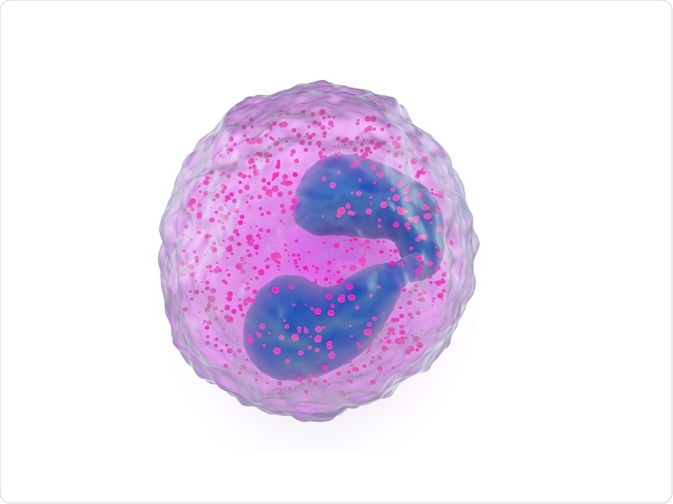Eosinophils are a specialized type of cell within the immune system that are involved in anti-parasitic and inflammatory responses. This article provides a brief overview of eosinophils.
 somersault1824 | Shutterstock
somersault1824 | Shutterstock
What are eosinophils?
Eosinophils are specialized pro-inflammatory white blood cells. They have a bilobed nucleus and are granulocytes, which means they contain granules within their cytoplasm. These granules contain enzymes and proteins with different functions.
Maturation and development of eosinophils
Eosinophils arise from hematopoietic stem cells (HSCs) in the bone marrow, and take approximately eight days to mature. After maturity, eosinophils migrate into the blood vessels and travel to target tissues around the body. Proteins and cytokines (such as IL-3, IL-5, and GM-CSF) are involved in the maturation, survival, and persistence of eosinophils.
Migration and movement of eosinophils
The migration and movement of eosinophils is promoted by chemokines, such as CCL11, CCL24 and CCL26 and chemokine receptors, such as CCR3. Eosinophils migrate to several organs through primary and secondary lymph organs, such as the thymus, lymph nodes, and spleen.
Granulocyte features
The granules in eosinophils contain four major proteins: major basic protein (MBP), eosinophil cationic protein (ECP), eosinophil peroxidize (EPO), and eosinophil-derived neurotoxin (EDN). These are involved in phagocytosis, cell killing, antigen presentation, and platelet interactions. Eosinophils phagocytose invading pathogens, allowing them to present pathogenic antigens to other cells. The actions of EPO also lead to oxidative burst, a crucial part of phagocytosis.
Eosinophil purpose and function
Parasitic infections
Eosinophils are crucial for combatting parasitic infections and inflammatory processes, such as allergic reactions. Other functions include killing cells, anti-bacterial activity, and controlling inflammatory responses.
Plasma cell survival
Eosinophils promote plasma cell survival to regulate the balance between T-helper and T-regulatory responses in various organs, such as gut and lungs. Eosinophils also regulate the glucose tolerance within adipose tissues and produce several different types of growth factors which contribute to tissue repair.
Eosinophil-platelet interactions
Platelets aid white blood cells to sense inflammatory stimuli and communicate with other cells. Eosinophil-platelet interactions occur through certain cell surface receptors, which promotes activation of the bound platelets and surrounding endothelial cells. This causes long-term inflammatory responses to be activated.
Eosinophil-platelet interactions can be strengthened via the expression of granulocytes and certain chemokines. This affects the long-term remodeling of tissues and can lead to chronic inflammation.
Eosinophils and infectious disease
Viral infections
Eosinophils are recruited in the lower airway epithelium during viral infections, such as a respiratory syncytial virus (RSV). RSV can activate eosinophils which promotes virus clearance through the production of ribonucleases and cytokines. Eosinophils are involved in the host response to the influenza virus. They undergo degranulation (the release of their granules), upregulate antigen presentation, and enhance effector T-cell responses,
Fungal infections
Eosinophils are activated by recognizing certain antigens present in fungi, such as β-glucan. Eosinophils release their proinflammatory and cytotoxic granule proteins, and various chemokines in response to a fungal infection. Eosinophils can phagocytose fungi, such as Cryptococcus neoformans and present antigens to other immune cells. They also release cytokines, such as IL-12, IFNγ, and TNF, during fungal infection. These cytokines promote the maturation of certain effector T-cells, which aid in the immune response to fungal infections.
Eosinophil in immune-mediated diseases and disorders
The increase of eosinophils within the blood is known as eosinophilia. This can result from disorders, such as leukemia.
Immune-mediated diseases
Under normal circumstances, eosinophils are not present in the skin. Several dermatological diseases exhibit tissue eosinophilia. Atopic dermatitis (AD) is an inflammatory disease of the skin characterized by dysfunction of epithelial cells. The improper expression and activity of eosinophils contribute to other dermatological diseases, such as chronic spontaneous urticaria, and gleich syndrome.
Further Reading
Last Updated: Jan 17, 2019